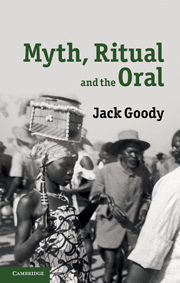Book contents
- Frontmatter
- Contents
- Acknowledgements
- Introduction
- 1 Religion and ritual from Tylor to Parsons: the definitional problem
- 2 Oral ‘literature’
- 3 The anthropologist and the audio recorder
- 4 Oral creativity
- 5 The folktale and cultural history
- 6 Animals, humans and gods in northern Ghana
- 7 The Bagre in all its variety
- 8 From oral to written: an anthropological breakthrough in storytelling
- 9 Writing and oral memory: the importance of the ‘lecto-oral’
- Appendix Folktales in northern Ghana
- References
- Index
Introduction
Published online by Cambridge University Press: 05 June 2012
- Frontmatter
- Contents
- Acknowledgements
- Introduction
- 1 Religion and ritual from Tylor to Parsons: the definitional problem
- 2 Oral ‘literature’
- 3 The anthropologist and the audio recorder
- 4 Oral creativity
- 5 The folktale and cultural history
- 6 Animals, humans and gods in northern Ghana
- 7 The Bagre in all its variety
- 8 From oral to written: an anthropological breakthrough in storytelling
- 9 Writing and oral memory: the importance of the ‘lecto-oral’
- Appendix Folktales in northern Ghana
- References
- Index
Summary
In this short volume I am not trying to say anything I have not said before. I am going back to a number of articles because, especially with my repeated recording of the Bagre, there is a problem which has brought me up against many discussions of ‘myth’, oral ‘literature’ and their relation to other aspects of social life. The whole discussion had become incrusted with a mystical quality which my own observations did little to confirm. Since I spent such a large part of my career in recording, transcribing and translating the various versions of LoDagaa ‘myth’ or recitation (together with my friend from the area, Kum Gandah), it seemed worthwhile trying to bring together some of these general observations.
The subject of myth and ritual has been of fundamental interest to anthropologists (and others) from the very beginning. They were supposed to have formed part of the characteristics of ‘primitive society’, like animism (the worship of nature) and euhemerism (the worship of the dead). As such they are features of ‘other cultures’, outside the bounds of ‘modern’ rationality, obeying another system of logic, or indeed being ‘pre-logical’, ‘irrational’ in our terms. I have wanted to adopt a more cognitive approach, partly because of my interest in communication, especially in orality and literacy, than is possible in the usual ‘functional’ and ‘structural’ (or post-structural) approaches to such activities. But there are others too.
- Type
- Chapter
- Information
- Myth, Ritual and the Oral , pp. 1 - 12Publisher: Cambridge University PressPrint publication year: 2010



